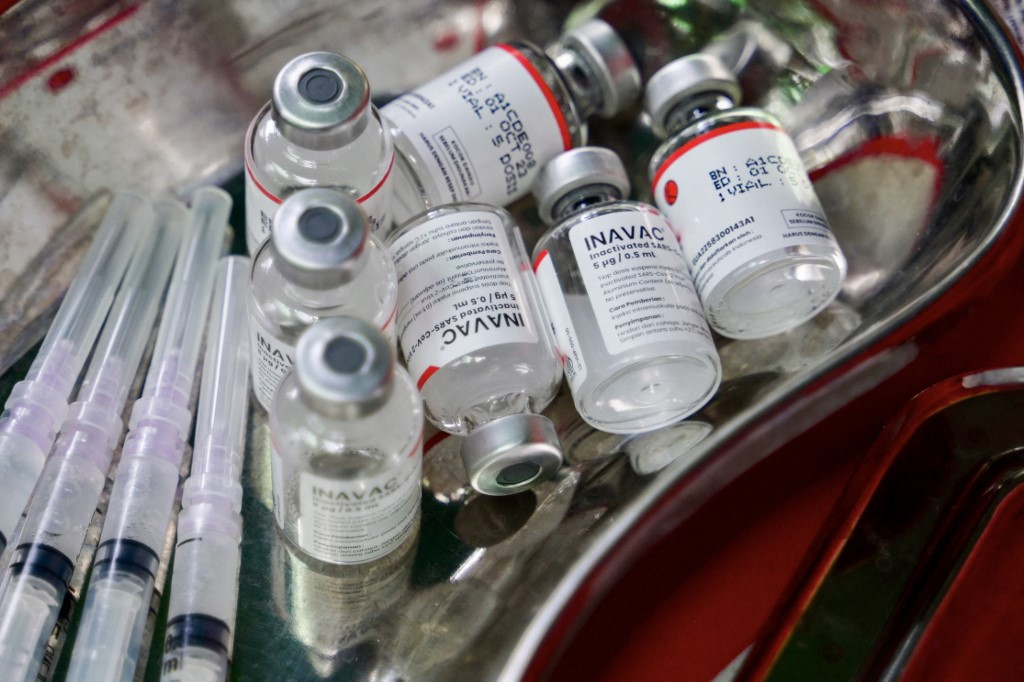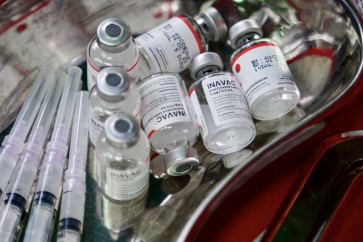Popular Reads
Top Results
Can't find what you're looking for?
View all search resultsPopular Reads
Top Results
Can't find what you're looking for?
View all search resultsSolidarity clouds loom over global health threats as 2023 ends
The injustice evident in the COVID-19 vaccine rollout exposed deep inequities in global health, leading to calls for a decolonization of international legal instruments like the World Health Organization (WHO) Pandemic Treaty
Change text size
Gift Premium Articles
to Anyone
 Vials containing the Inavac vaccine for COVID-19 are seen on Dec. 19, 2023, at the Jakarta Health Agency office during a vaccination campaign held to administer a fifth precautionary vaccine dose amid concerns that COVID-19 cases could spike during the Christmas and New Year's holidays. (AFP/Bay Ismoyo)
Vials containing the Inavac vaccine for COVID-19 are seen on Dec. 19, 2023, at the Jakarta Health Agency office during a vaccination campaign held to administer a fifth precautionary vaccine dose amid concerns that COVID-19 cases could spike during the Christmas and New Year's holidays. (AFP/Bay Ismoyo)
C
OVID-19 left a lasting scar on global solidarity and the right of all people to good health care. The unequal distribution of vaccines between countries at the height of the pandemic manifested as a global system privileging former colonial powers to the detriment of formerly colonized states, according to the United Nations Committee on the Elimination of Racial Discrimination.
A legacy of disparities and injustices has been shaped on the health and well-being of marginalized and indigenous populations. Colonial legacies often resulted in the suppression of indigenous healing traditions and the imposition of Western medical paradigms.
Colonialism's legacy is being challenged by a growing movement to decolonize global health governance and enable marginalized communities to voice their own healthcare systems. Community-based healthcare initiatives that tailor services to the specific needs and preferences of the local people are one of the practical steps. Ongoing efforts are underway to decolonize global health education by revising curricula to encompass diverse perspectives and local knowledge, experiences and practices.
Days after government officials took a break from frenzied pandemic negotiations, news broke that European countries had destroyed at least 215 million COVID-19 vaccine doses valued at over 4 billion euros (US$4.41 billion). In 2021, the European Union bought the equivalent of three doses per resident in secret deals with drug companies, hoarding these when low- and middle-income countries (LMICs) did not have access to any vaccines, not even for the health workers.
The injustice evident in the COVID-19 vaccine rollout exposed deep inequities in global health, leading to calls for a decolonization of international legal instruments like the World Health Organization (WHO) Pandemic Treaty. Proposals to waive intellectual property (IP) of vaccines in a potential Pandemic Treaty have run up against sharp resistance from the pharmaceutical industry and rich countries.
The WHO’s zero draft treaty proposes that 20 percent of pandemic-related products such as vaccines, diagnostics, protective equipment and therapeutics be allocated to the organization, which can then ensure equal distribution. The talks are due to conclude in May 2024 with an agreement to govern countries' conduct during pandemics, but parties seem to have entrenched disagreements about how best to ensure equitable access to vaccines and other medical products during future pandemics.
The increasing monopolization of entire economic sectors and various forms of profiteering are threatening to derail the Pandemic Treaty. Vaccine inequity was not only shaped by colonial division but also by the increasing monopolization of the health care sector by private companies.


















